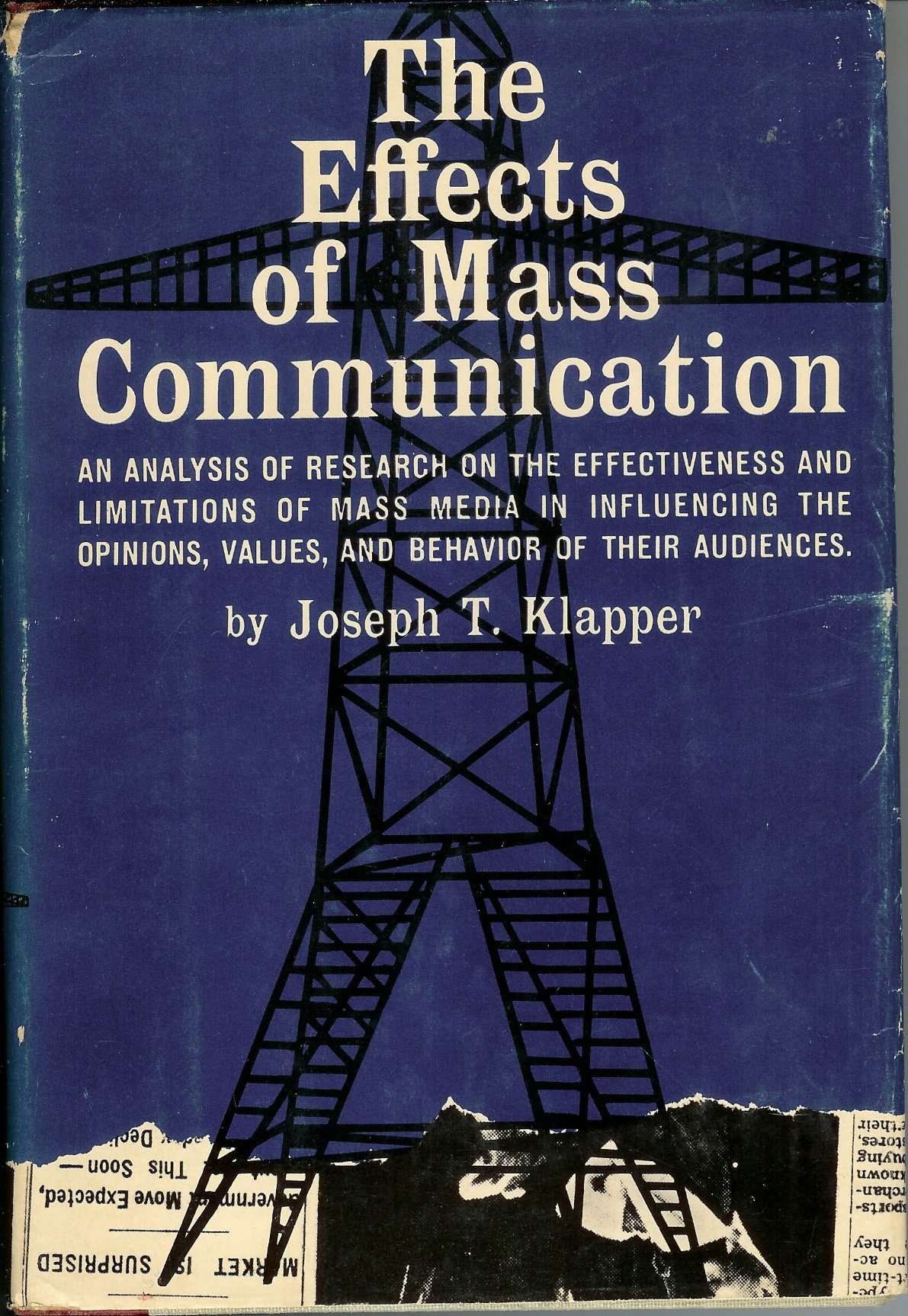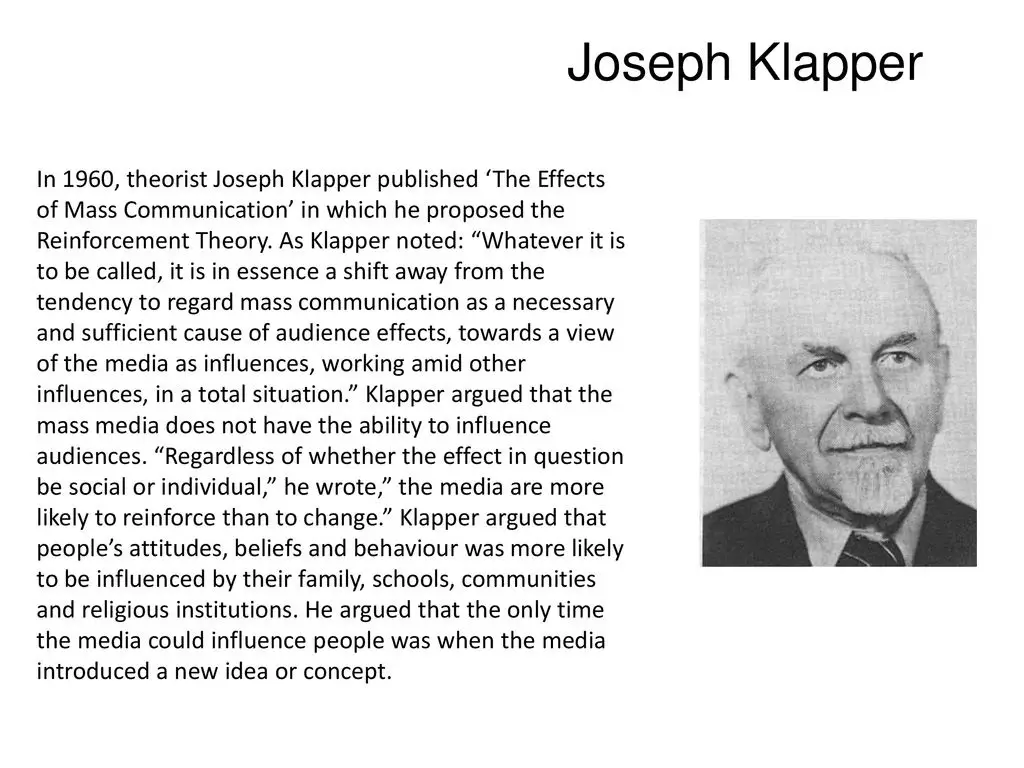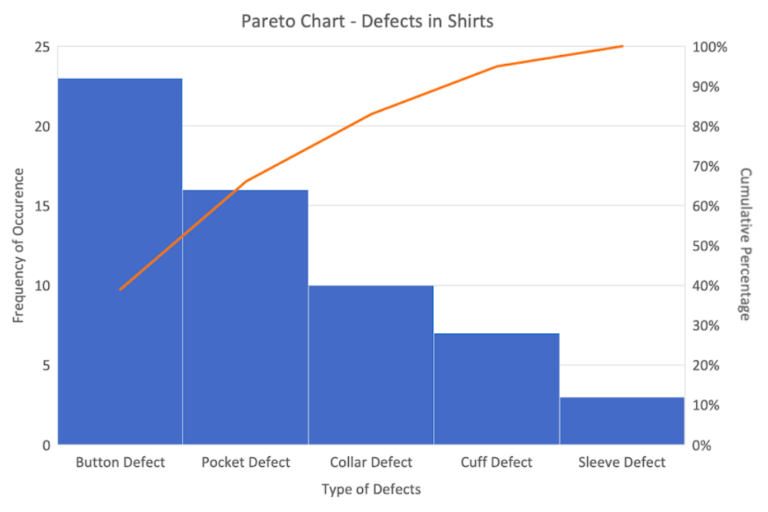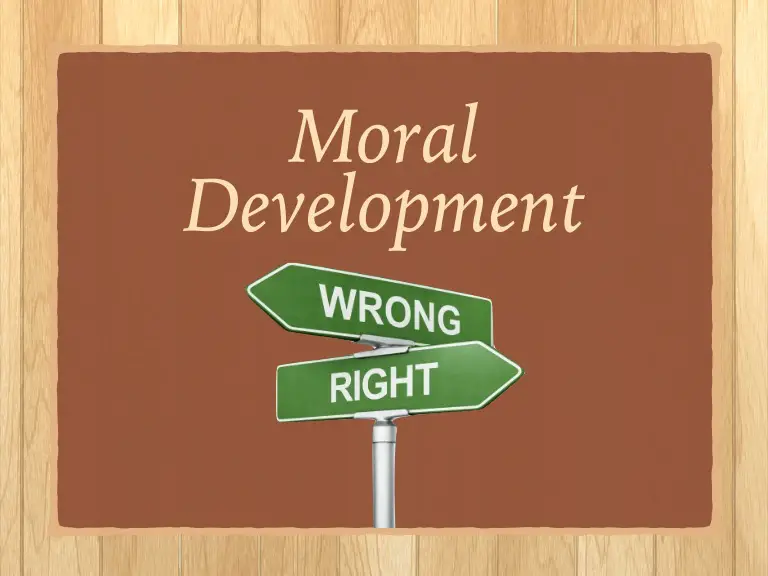Joseph Klapper Reinforcement Theory | Effects of Mass Communication
The reinforcement theory suggests that the media has a minimal direct effect on audiences. The media only supports or reinforces audience opinion, which is already shaped by influential socializing agents such as family, friends, school, and religion.
Klapper also suggests that the audience themselves are active, but they’re active within a broader community. They are active in terms of socializing, with friends, going to, workplaces going to church.
In 1960 Klapper wrote the influential book titled The Effects of Mass Communication. Unlike theories that existed prior, Klapper theorized that the media does not have a direct and powerful influence over audiences.
Instead, he suggested that the media is a part of a range of social factors that shape a person’s opinion, and in fact, the media is quite a small part compared to other factors.
Factors like family, friends, education, occupation, religion and social class, culture, and race, according to Klapper, are more influential in shaping an audience’s opinion than the media is.
However, Klapper did suggest that the media can influence those situations where a new idea or issue is being presented to a new audience where they don’t have a preexisting opinion.
Often, the audience sees something in the news that they haven’t quite spoken about at school or talked about with their families, then the media can influence their opinion.
Many people have come to believe that the media plays a significant role in the actions and behaviors of those who watch, listen and read it.
Some even believe that it teaches people and children that violence is okay through mediums like movies and video games.
Effects of Mass Communication
Communications professional Joseph Klapper created the reinforcement theory, and in 1960 he developed a series of generalizations that were intended to serve as a road map for defining if, how, when, and why the mass media may influence behavior.
💥🎁 New Year & Easter Deals On Amazon !
Don't miss out on the best discounts and top-rated products available right now!
🛒 Shop Now and Save Big Today!*As an Amazon Associate, I earn from qualifying purchases.

His theories in generalizations were then turned into a book known as the Effects of Mass Communications.
In this book, Klapper discusses that perhaps we are influenced by the media much at all, but instead the people around us who share our already formed beliefs.
Klapper wanted to show that the media influencing individuals watch much more than meets the eye.
Klapper wanted to either prove or disprove theories that already have been created, revolving around the mass media, for example, the magic bullet theory.
This theory discussed how the media had an immediate effect and influence on people. It also stated that the media institutions had the ability to manipulate human behavior.
Klapper believed that for many, the magic bullet could be a good explanation for things like anti-social behavior that would be difficult to explain otherwise. But Klapper disagreed with this theory anyway.
Instead, Klapper believed that reinforcement was the result of the following;
- Selective exposure,
- Selective perception and
- Selective retention,
Meaning that everybody is exposed to things differently.
We all perceive things differently, and then we retain information differently, meaning that reinforcement in a way is on a case by case basis and not really a generalized thing.
💥🎁 New Year & Easter Deals On Amazon !
Don't miss out on the best discounts and top-rated products available right now!
🛒 Shop Now and Save Big Today!*As an Amazon Associate, I earn from qualifying purchases.
Reinforcement of beliefs is also something that develops over time in continued exposure to something that consistently may influence behavior, but, in most cases, Klapper said, it must be over a large stretch of time to notice the difference, and it is very uncommon.
The reinforcement theory and parts of it can easily be compared to that of the uses and gratification theory, where people seek out information that will bring them gratification( You use something to make you happy)
Klapper also pointed out that individuals generally tend to expose themselves to information consistent with their beliefs and even reconstruct information incorrectly to make it consistent with those beliefs.
If someone were to see something opposed to what they believed, they would be more prone to hunt for media that coincides with what they believe and then reinforces it, bringing them gratification.
Joseph Klapper Research
Joseph Klapper collected secondary evidence from different studies conducted by other people and put it together to form his own theories.
Mostly reinforcement theory research was based on qualitative data and extended interviews or back and forth discussions.
One of the studies cited by Klapper was in 1948 study into political election voting where he was investigating election back then.
What Klapper concluded was in this 1948 study. A similar study took much later in 1991. It revealed that the most influential factor on a person’s political orientation or political opinion which party they would vote for was actually family.
In the 1948 version, one respondent even said that he was voting the way that he was because his grandfather would skin him alive if he voted for a different party.
Rarely will, they say, they voted based on TV ads. The chances are that it was through discussions with family and friends that they came to the decision that they took.
💥🎁 New Year & Easter Deals On Amazon !
Don't miss out on the best discounts and top-rated products available right now!
🛒 Shop Now and Save Big Today!*As an Amazon Associate, I earn from qualifying purchases.
What is constantly shaping a person’s opinion and ideas, attitudes, beliefs, and media comes from these social influences.
OJ vs. the People Example
A good example of the media not creating your beliefs but instead of reinforcing pre-existent ones would be the case of O. J versus the People, which has been highly discussed and highly shown in the media.
Before the trial, some people already believed that blacks and whites were not treated equally in the court of law, meaning that they already had a preexisting belief about the justice system.
The media further pushed the point that evidence wasn’t handled as carefully as it should have been making.
It looked like somebody was trying to frame O. J. This then reinforced the pre-existing beliefs of the people who believed in inequality.
The media played a role in this. These people were already predisposed to this belief.
As O. J. went free, many of the people who were not predisposed to this belief didn’t understand how he could get off so easily with the overwhelming amount of evidence.
Joseph Klapper the Effects of Mass Communication Today
Political Advertising
Political advertising is also something that plays a significant role in further influencing us and our beliefs chose a certain candidate in a quote that I found in an article about Nigerian political campaigns discusses perfectly the purpose of political advertising.
Unfortunately, much was witnessed in the 2016 US presidential campaign. But out of all mediums, Television is said to be the most successful medium and political advertising due to its use of sound, pictures, and video.
💥🎁 New Year & Easter Deals On Amazon !
Don't miss out on the best discounts and top-rated products available right now!
🛒 Shop Now and Save Big Today!*As an Amazon Associate, I earn from qualifying purchases.
In the 2016 election, we had a great chance to see many political ads that defend Donald Trump and Hillary Clinton supporters against one another.
More than less, these ads aimed to show the other candidate in a bad light and wanted to appeal to people’s already established beliefs.
For example, Donald Trump focused more on the Republican candidates and the blue-collar workers, the farmers, the factory workers, and the people who are losing their jobs by saying that he would bring jobs back into the country.
Hillary Clinton, on the other hand, focuses more on Democrats. She focused on the LGBT community, and she focused on strict gun control,l walls, and things like that, which made these two candidates polar opposites.
They were targeting viewers by focusing on a certain group to work on the beliefs that they already had established.
They wanted to make sure that that person stayed on their side and voted for them.
Now the media didn’t create the person’s view of that candidate, but instead just reinforced what they already believed. Good or bad. And unfortunately, political bias through news stations is widespread as well.
Some stations you’d see would talk about Donald Trump and goodly, or we talk about Hillary Clinton and Good Light, and then on others would talk about them badly, which also played a role and reinforcing whoever was watching the shows or ads.
According to the article, another article that I found interesting focused on youth smoking and how it reinforces it in good and bad light.
They believe that smoking could create a predisposition for people to smoke later in life and involve ads.
💥🎁 New Year & Easter Deals On Amazon !
Don't miss out on the best discounts and top-rated products available right now!
🛒 Shop Now and Save Big Today!*As an Amazon Associate, I earn from qualifying purchases.
According to Klapper’s theory, media is not what creates the predisposition, so this would be false. But instead, he says that predispositions are much more likely something created from being around other people.
In this quote by Robert Wicks, it says
The adoption of views held by a group of calm conversion is likely when one resides within, whereas in frequent contact with the group holding clearly defined attitudes and beliefs. Thus, human interaction is probably far more likely to alter attitudes and beliefs than or the media.
Meaning in this article, where it says that ads on the TV create youth smoking. It’s false instead yet could be reinforced by the ads.
But first, you’re being predisposed to it somewhere else.
Fake News
Fake news is also buzzed about when it comes to reinforcement and our beliefs, both political and nonpolitical. To the average reader, Fake news is false information or propaganda being passed off is accurate information.
Unfortunately, fake news is much too real in journalism to the bloggers and people who want to sway others from a certain viewpoint or people who are not industry professionals.
Like Klapper said before, some people are even willing to make up information to go along with their beliefs.
One person that we heard mentioned fake news multiple times was Donald Trump in the election. If something didn’t favorably talk about him, then he would consider it fake news.
💥🎁 New Year & Easter Deals On Amazon !
Don't miss out on the best discounts and top-rated products available right now!
🛒 Shop Now and Save Big Today!*As an Amazon Associate, I earn from qualifying purchases.
But this fake news could reinforce people in a bad way if it’s giving you the wrong information.
Role of Social Media in Reinforcement Theory
Reinforcement Theory proposes that the external environment and belief system govern social behavior, but media has played a role in reinforcing the behavior.
Social Media Echo Chamber
Fake news also accompanies the social media echo chamber, which focuses on filtering out opposing viewpoints and creating a sort of echo chamber for yourself.
This is often for people who want to avoid confrontation and surround themselves with only people who agree with them.
Some people go as far as to delete or block someone with an opposing viewpoint, and the problem with this is once again like, Klapper said.
Sometimes people seek out things that reinforced their preexisting beliefs. They want to focus on stuff that is only going to bring light to what they already believe.
The social media echo chamber is a perfect example of this. They are filtering out any information of opposing viewpoints or anybody who may disagree with what they believe. Instead, they’re surrounding themselves with people who believe the same things as them.
In conclusion of Klappers Theory of Reinforcement
- The media cannot create people’s opinions but only reinforce what they already believe.
- Our actions or not because of the media, but exposure to certain reinforcement could impact behavior over time.
- People often try and only reinforce what they already believe or go looking for reinforcement like those stuck in the social media echo chamber.
- Unfortunately, blocking out opposing viewpoints doesn’t lessen confrontation but instead makes opinion stronger and harder to discuss.
Criticisms of Klappers Theory of Reinforcement
- The theory fails to answer this question; if we get our opinion from our social circle, where does our social circle get their opinions and beliefs?
- If beliefs are shaped by existing institutions such as family school, religion, what explanation is there for when there is sometimes a social change or change in beliefs?
- Another criticism is that reinforcement theory doesn’t explain the nature of media influence when presenting an idea, or neither has some influence.
- The use of qualitative data requires interpretation by the researcher, which may result in bias. If you’ve got something to prove, then obviously, you’re going to look for examples in a research participant’s response to support your ideas.
- Some social institutions, particularly the church, have lost prominence over the years. Whereas media has gain popularity and use.



